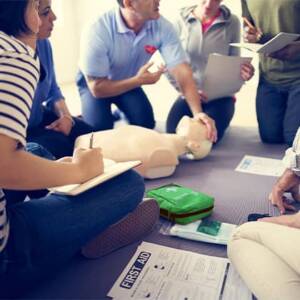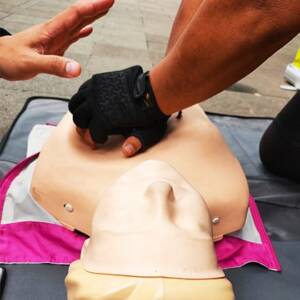A mental health champion is someone who has been trained to offer help to those who need some additional support when they are struggling. They organise events, promote positive mental health and offer a listening ear to those who need it. What is a mental health champion? Being a mental health champion means that…
First Aid Advice
In addition to the courses we offer, here you’ll find first aid advice and news from Safety First Aid Training to help you deal with a range of common accidents and conditions in everyday life, be that at work, home or play. However, in an emergency, always dial 999.
A compression head injury, or cerebral compression, is a swelling or bleeding in the skull which puts pressure on the brain. If you are treating someone for a compression head injury, you must call emergency services and keep the casualty stable. What are the signs and symptoms of a compression head injury? There are…
SALTAPS is an acronym generally used in sports first aid to check if a player needs to rest and be removed from play or can continue. However, it can be used to assess all minor injuries, not just those acquired on the sports field. What does SALTAPS stand for? As with all acronyms, each…
CPR stands for cardiopulmonary resuscitation, and is the method used to give someone a better chance at survival after they suffer a cardiac arrest. It is important to know what the guidelines are for performing this procedure wherever you are based. What is CPR? Cardiopulmonary resuscitation, or CPR, is a potentially lifesaving procedure that…
It’s important to create an honest and open environment in the workplace where employees feel comfortable talking about stress and mental health. When the stigma around poor mental health is removed, employees are more likely to talk about their feelings and seek the support they need. The prevalence of stress in the workplace Has…
Your mental health is one of the most important parts of your overall well-being. It dictates your ability to operate emotionally, psychologically, socially and in some cases, physically. Your mental health is just like your physical health – taking care of it should be a priority. Good mental health means having the ability to think,…
Aspirin is commonly used as a painkiller and anti-inflammatory medication and can help to reduce the risk of heart attack in some cases. There’s debate, however, about whether first aiders should administer aspirin to suspected heart attack patients. What is aspirin? Aspirin is an everyday painkiller effective on ailments like toothaches, headaches, period pain and…
The need for insurance is a common concern among people learning first aid. Frequent questions include: “Can I be sued if I practice first aid incorrectly?” “Are there any penalties if I’m unable to help someone with first aid?” “Do I need insurance to provide first aid?” It is highly unlikely that you will…
Poor mental health is one of the most common issues that leads to workplace absence in the UK, with research showing that almost half of the workforce has experienced a mental health problem in their current job. Not only do mental health issues negatively affect the lives of workers, but they also impact businesses financially…
You can’t predict when you or someone in your workplace will have an accident – basic first aid training will help you to prevent a minor injury from developing into something more serious. You can make the difference between a life lost or saved in an emergency. Anyone can become a first aider, and taking…










